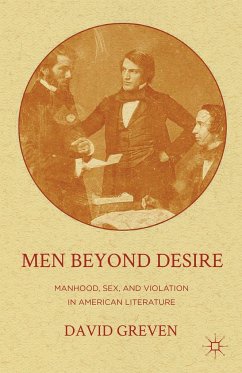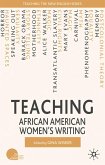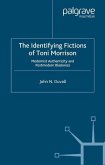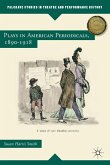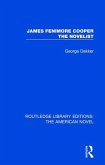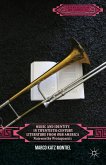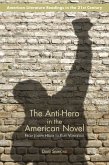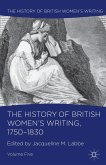This book explores the construction of male sexuality in nineteenth-century American literature and comes up with some startling findings. Far from desiring heterosexual sex and wishing to bond with other men through fraternity, the male protagonists of classic American literature mainly want to be left alone. Greven makes the claim that American men, eschewing both marriage and male friendship, strive to remain emotionally and sexually inviolate. Examining the work of traditional authors - Hawthorne, Poe, Melville, Cooper, Irving, Stowe - Greven discovers highly untraditional and transgressive representations of desire and sexuality. Objects of desire from both women and other men, the inviolate males discussed in this study overturn established gendered and sexual categories, just as this study overturns archetypal assumptions about American manhood and American literature.
Hinweis: Dieser Artikel kann nur an eine deutsche Lieferadresse ausgeliefert werden.
Hinweis: Dieser Artikel kann nur an eine deutsche Lieferadresse ausgeliefert werden.
"It delivers several provocative new arguments...Almost every chapter offers new ways of rethinking familiar texts...Many texts and historical figures pop up; Greven has an ambitious reach... Greven s assertions often have imaginative zest...Greven has written a fine first book: sophisticated, smart, ambitious, intellectually courageous. It should provoke antebellum critics and queer theorists as well as Melvilleans to rethink utopian idealizations of male fraternity." - David Leverenz, Leviathan: A Journal of Melville Studies
"A reading that makes us perceive a classic work in a genuinely new way is always rare and impressive, and Greven gives us such interpretations of 'The Legend of Sleepy Hollow' and The Scarlet Letter....Engaging and provocative. In this book there is much to admire, to learn from, and - dare I say it - simply to enjoy, for Greven is a talented close reader, a well-read and diligent scholar, and an amusing quipster." - Axel Nissen, Nineteenth-Century Literature
"Men Beyond Desire presents a refreshing and comprehensive study of the representation of gender and gendered relationships by authors such as Irving, Cooper, Poe, Hawthorne, and Stowe, among others. . . .. Greven persuasively separates the inviolate male . . .from the figure of the bachelor . . .and questions the critical and cinematic tendency to idealize homosocial or fraternal bonds as a way of reinforcing heterosexuality and erasing queer potentiality. " - American Studies Today
"What I am most struck by as a critic of nineteenth-century literature is the masterful re-envisioning of much studied and much-explicated American classics...A groundbreaking work of criticism that will be discussed, debated, and admired for years to come." - Michael T. Gilmore, Brandeis University, author of American Romanticism and the Marketplace"Many brilliant insights . . .Men Beyond Desire is dense with ideas and wide-ranging in its use of sources . . . I am grateful to have a critic like David Greven as a guide to the very serious ideas about gender roles contained in our national literature, and the sometimes frightening implications that these ideas continue to hold for all of us." - Gay and Lesbian Review (September/October 2006 issue)
"In this provocative and often penetrating examination of the American self-made man, desperate to maintain his inviolability in the face of compulsory demands for heterosexual marriage and homosocial fraternal camaraderie, David Greven explores the creation of and the resulting consequences for this male icon as embodied in such literary characters as Natty Bumppo and Ichabod Crane, Fanshawe and Billy Budd, Roderick Usher and Miles Coverdale, Arthur Dimmesdale and Uncle Tom . . .Greven probes, suggests, and points out multi-layered ambiguities within the texts . . .a lively and unsettling book that, as all good criticism does, forces us to see what we took to be familiar as, in many cases, radically unfamiliar. . . . You come away from this book convinced that it has plumbed the darker depths of American culture." - The Nathaniel Hawthorne Review"Greven brings a great deal of erudition, spirit, and interpretive subtlety to a task that has inherent difficulties, since he is required to read behind the surface of fiercely maintained defense mechanisms to the male distresses they are meant to conceal. Men Beyond Desire is a gallant successor to G. J. Barker-Benfield s The Horrors of the Half-Known Life [that] casts light on confused questions." - Men and Masculinities"A summary cannot do justice to Greven s tenacious and often brilliant readings. His observations on 'fraternalist bias' within contemporary criticism and theory are particularly provocative, as is his emphasis on the violence perpetrated against non-normative figures. Although the inviolate male s resistance has heroic aspects, his isolation is frequently disturbing; the book is far from a paean to American individualism . . .a valuable and engaging contribution to recent work on gender and antebellum literature." - Journal of American Studies
"There is much to value in Greven's work. Beyond the strong readings, of Irving and Hawthorne in particular, and beyond the keen sense it shows of the collision between Jacksonian ideals of the self-made man and reformist insistences on purity and sentimental propriety, the book offers a bracing take on the dynamics of male intimacies in the nineteenth century, one that recognizes the presence of a variety of sentimental modes but insists too on the rivalry, fear, violence, and enmity that made the world of homosociality no less perilous, for the sexually nonnormative, than the world of reproductive heterosexuality." - Studies in American Fiction
"A reading that makes us perceive a classic work in a genuinely new way is always rare and impressive, and Greven gives us such interpretations of 'The Legend of Sleepy Hollow' and The Scarlet Letter....Engaging and provocative. In this book there is much to admire, to learn from, and - dare I say it - simply to enjoy, for Greven is a talented close reader, a well-read and diligent scholar, and an amusing quipster." - Axel Nissen, Nineteenth-Century Literature
"Men Beyond Desire presents a refreshing and comprehensive study of the representation of gender and gendered relationships by authors such as Irving, Cooper, Poe, Hawthorne, and Stowe, among others. . . .. Greven persuasively separates the inviolate male . . .from the figure of the bachelor . . .and questions the critical and cinematic tendency to idealize homosocial or fraternal bonds as a way of reinforcing heterosexuality and erasing queer potentiality. " - American Studies Today
"What I am most struck by as a critic of nineteenth-century literature is the masterful re-envisioning of much studied and much-explicated American classics...A groundbreaking work of criticism that will be discussed, debated, and admired for years to come." - Michael T. Gilmore, Brandeis University, author of American Romanticism and the Marketplace"Many brilliant insights . . .Men Beyond Desire is dense with ideas and wide-ranging in its use of sources . . . I am grateful to have a critic like David Greven as a guide to the very serious ideas about gender roles contained in our national literature, and the sometimes frightening implications that these ideas continue to hold for all of us." - Gay and Lesbian Review (September/October 2006 issue)
"In this provocative and often penetrating examination of the American self-made man, desperate to maintain his inviolability in the face of compulsory demands for heterosexual marriage and homosocial fraternal camaraderie, David Greven explores the creation of and the resulting consequences for this male icon as embodied in such literary characters as Natty Bumppo and Ichabod Crane, Fanshawe and Billy Budd, Roderick Usher and Miles Coverdale, Arthur Dimmesdale and Uncle Tom . . .Greven probes, suggests, and points out multi-layered ambiguities within the texts . . .a lively and unsettling book that, as all good criticism does, forces us to see what we took to be familiar as, in many cases, radically unfamiliar. . . . You come away from this book convinced that it has plumbed the darker depths of American culture." - The Nathaniel Hawthorne Review"Greven brings a great deal of erudition, spirit, and interpretive subtlety to a task that has inherent difficulties, since he is required to read behind the surface of fiercely maintained defense mechanisms to the male distresses they are meant to conceal. Men Beyond Desire is a gallant successor to G. J. Barker-Benfield s The Horrors of the Half-Known Life [that] casts light on confused questions." - Men and Masculinities"A summary cannot do justice to Greven s tenacious and often brilliant readings. His observations on 'fraternalist bias' within contemporary criticism and theory are particularly provocative, as is his emphasis on the violence perpetrated against non-normative figures. Although the inviolate male s resistance has heroic aspects, his isolation is frequently disturbing; the book is far from a paean to American individualism . . .a valuable and engaging contribution to recent work on gender and antebellum literature." - Journal of American Studies
"There is much to value in Greven's work. Beyond the strong readings, of Irving and Hawthorne in particular, and beyond the keen sense it shows of the collision between Jacksonian ideals of the self-made man and reformist insistences on purity and sentimental propriety, the book offers a bracing take on the dynamics of male intimacies in the nineteenth century, one that recognizes the presence of a variety of sentimental modes but insists too on the rivalry, fear, violence, and enmity that made the world of homosociality no less perilous, for the sexually nonnormative, than the world of reproductive heterosexuality." - Studies in American Fiction

